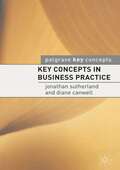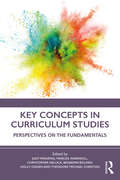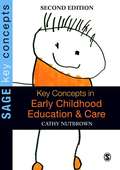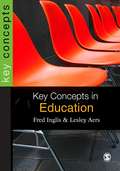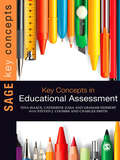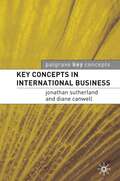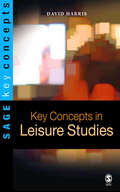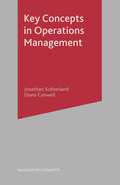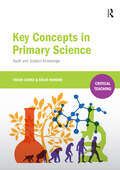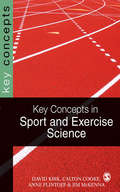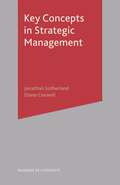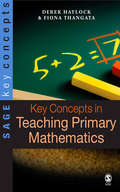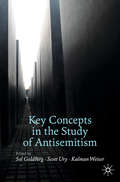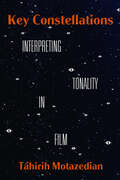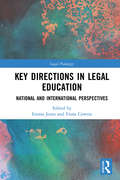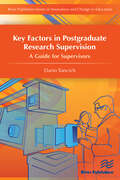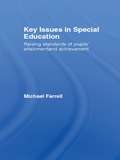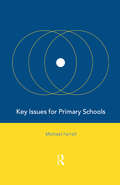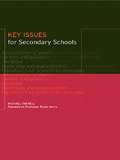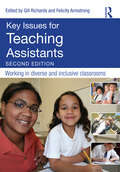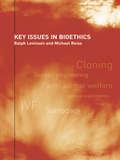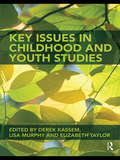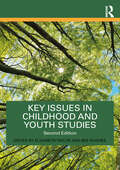- Table View
- List View
Key Concepts in Business Practice (Key Concepts)
by Jonathan SutherlandKey Concepts in Business Practice is one of a range of comprehensive glossaries with entries arranged alphabetically for easy reference. All major concepts, terms, theories and theorists are incorporated and cross-referenced. Additional reading and Internet research opportunities are identified. More complex terminology is made clearer with numerous diagrams and illustrations. With over 500 key terms defined, the book represents a comprehensive must-have reference for anyone studying a business-related course or those simply wishing to understand what business practice is all about. It will be especially useful as a revision aid.
Key Concepts in Curriculum Studies: Perspectives on the Fundamentals
by Judy Wearing Theodore Michael Christou Marcea Ingersoll Christopher DeLuca Benjamin Bolden Holly OgdenOffering an accessible entry into curriculum theory, this book defines and contextualizes key concepts for novice and experienced students. Leading scholars in curriculum studies provide short anchor texts that introduce, define, and situate contemporary curriculum theory constructs. Each anchor text is followed by two concise, creative keyword responses that demonstrate varied perspectives and connections, allowing readers to reflect on and engage with the personal relevance of these fundamental concepts. Useful to instructors and scholars alike, this book explains keyword writing as a teaching and learning strategy and invites readers to enter the complicated conversations of contemporary curriculum theory through their own creative, personal responses. Featuring wide-ranging, nuanced, and varied commentary on major relevant themes, as well as discussion questions for students, this book is an essential text for doctoral and masters-level courses in curriculum studies.
Key Concepts in Early Childhood Education and Care (SAGE Key Concepts series)
by Cathy NutbrownThis new edition of Cathy Nutbrown′s much loved book explains the key ideas and issues in Early Childhood clearly and concisely, keeping students up-to-date with the latest developments in the field. There are brand new entries on: - Attachment - Babies′ learning and development - Children′s Centres - Citizenship - Digital Technologies - Early Years Foundation Stage - Early Years Professional Status - Neuroscience - Sexualities The rest of the book has also been thoroughly updated and revised, and includes coverage of heuristic play, Early Literacy Development and Parental Involvement. The book offers starting points which provide a clear focus, further reading and discussion of research on thirty-five key topics. It is a must for students following courses in early childhood education and care. Professor Cathy Nutbrown directs and teaches on Masters and Doctoral programmes in Early Childhood Education at the University of Sheffield.
Key Concepts in Education (SAGE Key Concepts series)
by Fred Inglis Lesley Aers[The SAGE Key Concepts series provides students with accessible and authoritative knowledge of the essential topics in a variety of disciplines. Cross-referenced throughout, the format encourages critical evaluation through understanding. Written by experienced and respected academics, the books are indispensable study aids and guides to comprehension.] ′Dipping into this short collection reveals an eminently useful resource aimed at providing not just a use-friendly lexicon but also an example of a degree of criticality for those new to the area of education….the authors manage to tackle some serious issues with conviction, clarity and concision, all the while maintaining a sense of humour where comparable examples merely seem pedantic′ - ESCalate ′This is an essential resource for anyone serious about using the English Language to talk about teaching and learning....Inglis and Aers provide a resource for [a common professional language] in their compact and highly accessible book. It has a sound philosophical rationale in which 102 key concepts in education are presented alphabetically and cross-referenced (the book reads like a high quality hyperlinked web-page)′ - www.thinkingclassroom.co.uk ′This is an engaging and accessible resource which explains various sociological, philosophical and psychological concepts relevant to contemporary educational practice. The concepts are succinctly and sometimes provocatively defined and related to today′s pressing issues. It will be a particularly useful reference tool for students and practitioners of education alike, with each entry including references for further reading′ - Geoff Whitty, Director, Institute of Education, University of London ′If you are seeking a clear guide to principles which should guide public life in general and education in particular, look no further. Inglis and Aers write with enviable and compelling clarity. Something for all in education especially practitioners and policy makers to read and return to′ - Tim Brighouse, recently Chief Adviser for London Schools and formerly Chief Education Officer for Birmingham This text provides students with over 100 essential themes, topics and expressions that Education students are likely to encounter, both during their courses and beyond in professional practice. Co-authored to draw on experiences of working within academia, local authorities and the classroom, the entries provide: - a definition of the concept - a description of the historical and practical context - an explanation of how the concept is applied - an evaluation of the concept - helpful references and suggested further reading This book will be essential reading for students of Education, and an invaluable reference tool for their professional careers. Fred Inglis is Emeritus Professor of Cultural Studies, University of Sheffield. Lesley Aers is a senior member of a local authority school improvement service and an Ofsted inspector. Both authors are former schoolteachers.
Key Concepts in Educational Assessment (SAGE Key Concepts series)
by Charles Smith Graham Herbert Catherine Zara Tina Isaacs Steven J CoombsKey Concepts in Educational Assessment provides expert definitions and interpretations of common terms within the policy and practice of educational assessment. Concepts such as validity, assessment for learning, measurement, comparability and differentiation are discussed, and there is broad coverage of UK and international terminology. Drawing on the considerable expertise of the authors, the entries provide: - clear definitions - accounts of the key issues - authoritative and reliable information - suggestions for further reading Created to support students of education on undergraduate and postgraduate courses, and established education professionals including those who are members of the Chartered Institute of Educational Assessors (CIEA), this book is an accessible guide for anyone engaged in educational assessment. Tina Isaacs is Director of the MA in Educational Assessment at the Institute of Education, London. Catherine Zara was most recently Director of the MA in Educational Assessment and Director of the BA (Hons) in Post Compulsory Education and Training at the University of Warwick. Graham Herbert was most recently Director of the CIEA. Steve J. Coombs is Head of Department for Continuing Professional Development at Bath Spa University, which offers an MA in Educational Assessment. Charles Smith is senior lecturer in economics and education at Swansea Metropolitan University of Wales Trinity Saint David.
Key Concepts in International Business (Key Concepts)
by Jonathan SutherlandKey Concepts in International Business is one of a range of comprehensive glossaries with entries arranged alphabetically for easy reference. All major concepts, terms, theories and theorists are incorporated and cross-referenced. Additional reading and Internet research opportunities are identified. More complex terminology is made clearer with numerous diagrams and illustrations. With over 500 key terms defined, the book represents a comprehensive must-have reference for anyone studying a business-related course or those simply wishing to understand what international business is all about. It will be especially useful as a revision aid.
Key Concepts in Learning Disabilities (SAGE Key Concepts series)
by Tom Mason Geoff Astbury Pat Talbot"A helpful resource for those undertaking studies in learning disabilities at all levels. I shall definitely be recommending it to my students!" - John Boarder, Bangor University "This book provides a valuable and innovative contribution to the field of Learning Disabilities." - Logan Parumal, University of Manchester Key Concepts in Learning Disabilities is a handy guide to the topics you need to know about whether studying or working in the field of Learning Disabilities. The A-Z format allows you to "dip in" and quickly find relevant information on topics ranging from Autism to Rights and from Advocacy to Challenging Behaviours. Each entry features: - a snapshot definition of the concept; - a broader discussion of the main issues and applications to practice; - key points; - a case study, and - signposts to further reading. Key Concepts in Learning Disabilities is an ideal companion to study and particularly useful for those completing academic assignments as part of training. Written by a team of experienced practitioners and lecturers, the book reflects the multi-disciplinary nature of contemporary practice.
Key Concepts in Leisure Studies (SAGE Key Concepts series)
by David E Harris`This book confirms David Harris′ status as a leading theorist in contemporary culture and leisure in the UK. He offers a distinctive, coherent and authoritative guide to the major concepts and debates that should engage leisure scholars and scholarship′ - Dr Peter Bramham, Senior Lecturer in Leisure Studies, Leeds Metropolitan University Written with the needs of today′s student in mind, the SAGE Key Concepts series provides accessible, authoritative and reliable coverage of the essential issues in a range of disciplines. Written in each case by experienced and respected experts in the subject area, the books are indispensable study aids and guides to comprehension. Cross-referenced throughout, the format encourages understanding without sacrificing the level of detail and critical evaluation essential to convey the complexity of the issues. Key Concepts in Leisure Studies: • Provides a student-friendly guide to the key debates in leisure studies • Reflects recent developments in the field, encompassing related work in media studies, cultural studies, sports studies and sociology • Cross-references each 1500 word exposition to other concepts in the field • Offers definitions, section outlines and further reading guidance for independent learning • Is supported by the author′s website http:/www.arasite.org/keyconc.html • Is essential reading for undergraduates and NVQ students in leisure studies.
Key Concepts in Operations Management (Key Concepts)
by Jonathan SutherlandKey Concepts in Operations Management is one of a range of comprehensive glossaries with entries arranged alphabetically for easy reference. All major concepts, terms, theories and theorists are incorporated and cross-referenced. Additional reading and Internet research opportunities are identified. More complex terminology is made clearer with numerous diagrams and illustrations. With almost 600 key terms defined, the book represents a comprehensive must-have reference for anyone studying a business-related course or those simply wishing to understand what operations management is all about. It will be especially useful as a revision aid.
Key Concepts in Primary Science: Audit and Subject Knowledge (Critical Teaching)
by Vivian Cooke Colin HowardThis is essential reading for all primary science trainee and beginning teachers who want to strengthen their science subject knowledge. Each chapter tackles a major theme of the new national curriculum and breaks it down into key concepts. For each concept there is a detailed audit to help readers identify their current levels of knowledge and understanding along with areas for development. This is followed by concise definitions, key terminology, detailed examples and ‘in practice’ ideas to clearly relate theory to classroom practice. Finally, readers are invited to re-check their understanding and assess their level of competence at the end of each section. The text enables teachers to feel secure in their subject knowledge and confident about effectively conveying that information to their pupils through appropriate subject-specific pedagogy.
Key Concepts in Sport and Exercise Sciences (SAGE Key Concepts series)
by David Kirk Jim Mckenna Anne Flintoff Carlton B. Cooke'A very useful introduction to the key concepts in five main areas of study in sport and exercise science. The multi-disciplinary nature of the book is particularly attractive as it means that it can be used to support students studying a range of sport and exercise courses and modules. Furthermore, the chapters are concise, informative, written in an accessible style, and provide a good balance between theory and application to practice, making it a very interesting and relevant read' - Dr Lorraine Cale, Loughborough University This book provides students and scholars with a fail-safe guide to the key concepts in the field of Sport & Exercise Science. Intelligently cross-referenced entries provide a sound map of the multi-disciplinary demands of sport related courses including physical and biological sciences, social science and education. The entries use clear definitions, examples and suggestions for further reading to explore each discipline and are: " Comprehensive " Lucid " Pertinent to study needs " Practically relevant David Kirk is Professor in Physical Education and Youth Sport Carlton Cooke is Professor in Physical Education Anne Flintoff is Reader in Physical Education Jim McKenna is Professor in Physical Activity and Health All at the Carnegie Faculty of Sport and Education, Leeds Metropolitan University.
Key Concepts in Strategic Management (Key Concepts)
by Jonathan SutherlandKey Concepts in Strategic Management is one of a range of comprehensive glossaries with entries arranged alphabetically for easy reference. All major concepts, terms, theories and theorists are incorporated and cross-referenced. Additional reading and Internet research opportunities are identified. More complex terminology is made clearer with numerous diagrams and illustrations. With over 500 key terms defined, the book represents a comprehensive must-have reference for anyone studying a business-related course or those simply wishing to understand what strategic management is all about. It will be especially useful as a revision aid.
Key Concepts in Teaching Primary Mathematics (SAGE Key Concepts series)
by Derek HaylockCovering the key principles and concepts in the teaching and learning of mathematics in primary schools, this text provides trainee and practising teachers with a quick and easy reference to what they need to know for their course, and in the classroom. The entries are arranged alphabetically, and each contains a brief definition, followed by an explanation and discussion, practical examples and annotated suggestions for further reading. Examples of the wide-ranging material include: Anxiety about mathematics; Assessment for Learning; Cognitive conflict; Concept learning; Creativity in mathematics; Differentiation; Equivalence; Explanation; Investigation; Low attainment; Making connections; Meaningful context; Mental calculation; Numeracy; Play as a context for learning mathematics; Problem-solving; Questioning; Talk.
Key Concepts in the Study of Antisemitism (Palgrave Critical Studies of Antisemitism and Racism)
by Scott Ury Kalman Weiser Sol GoldbergThis volume is designed to assist university faculty and students studying and teaching about antisemitism, racism, and other forms of prejudice. In contrast with similar volumes, it is organized around specific concepts instead of chronology or geography. It promotes conversation about antisemitism across disciplinary, geographic, and thematic lines rather than privileging a single methodological paradigm, a specific academic field, or an overarching narrative. Its twenty-one chapters by leading scholars in diverse fields address the relationship to antisemitism of concepts ranging from Anti-Judaism to Zionism. Each chapter not only traces the history and major scholarly debates around a key concept; it also presents an original argument, points to avenues for further research, and exemplifies a method of investigation.
Key Constellations: Interpreting Tonality in Film (California Studies in Music, Sound, and Media #4)
by Táhirih MotazedianKey is one of the simplest building blocks of music and is among the foundational properties of a work’s musical identity—so why isn’t it a standard parameter in discussing film music? Key Constellations: Interpreting Tonality in Film is the first book to investigate film soundtracks—including original scoring, preexisting music, and sound effects—through the lens of large-scale tonality. Exploring compelling analytical examples from numerous popular films, Táhirih Motazedian shows how key and pitch analysis of film music can reveal hidden layers of narrative meaning, giving readers exciting new ways to engage with their favorite films and soundtracks.
Key Directions in Legal Education: National and International Perspectives (Legal Pedagogy)
by Emma Jones Fiona CownieKey Directions in Legal Education identifies and explores key contemporary and emerging themes that are significant and heavily debated within legal education from both UK and international perspectives. It provides a rich comparative dialogue and insights into the current and future directions of legal education. The book discusses in detail topics like the pressures on law schools exerted by external stakeholders, the fostering of interdisciplinary approaches and collaboration within legal education and the evolution of discourses around teaching and learning legal skills. It elaborates on the continuing development of clinical legal education as a component of the law degree and the emergence and use of innovative technologies within law teaching. The approach of pairing UK and international authors to obtain comparative insights and analysis on a range of key themes is original and provides both a genuine comparative dialogue and a clear international focus. This book will be of great interest for researchers, academics and post-graduate students in the field of law and legal pedagogy.
Key Factors in Postgraduate Research Supervision A Guide for Supervisors
by Dario ToncichKey Factors in Postgraduate Research Supervision - A Guide for Supervisors is designed to inform and support university academics and researchers who are taking on the responsibilities of postgraduate research student supervision. It is aimed at early career professionals, who may be undertaking supervision for the first time, and also experienced supervisors seeking to develop a more formal framework for their supervision, in an increasingly complex academic environment. The objective of the book is to help supervisors create the complete postgraduate student. That is, an individual who can develop the rigors and disciplines of research conduct and research writing, as well as a broader understanding of the environment in which many postgraduate qualified professionals will work. The majority of postgraduate research students in the modern world ultimately use their acquired skills to work outside the university research environment, so emphasis is given to preparing research students for these varied roles, which can include management; commercial research or start-up company pathways. Any competent academic can be a good research supervisor when things are going well. Real supervisory skills only come into play when things have gone awry. That is when a professional and structured approach to problem solving and conflict resolution is required. This book seeks to provide the framework in which supervisors can develop such an approach. The topics covered in this text cover the spectrum of the supervisory process, from understanding the university research environment, through to recruiting students; induction; planning of the research program; peer review and thesis/dissertation preparation. Additionally, important peripheral issues, such as preparing graduates for various future roles; managing collaborative research programs; managing cases of misfeasance, and developing long-term relationships with students are also covered.
Key Issues In Special Education: Raising Standards Of Pupils' Attainment And Achievement
by Michael FarrellConsiderable challenges can face all those involved in teaching children with special educational needs. Complex policy and legislation, bureaucracy, inspection and limited resources can all appear difficult obstacles to those seeking to provide effective tuition. In this highly practical book, Michael Farrell unpicks and clarifies the role of educational standards in today's schools. Drawing extensively on detailed, real-life case studies, he closely explores such issues as: the definition of standards, identifying and providing for special educational needs, assessment and benchmarking, curriculum provision and target-setting, the role of the Code of Practice. Special educational needs coordinators, senior managers in schools and students completing initial training courses will find this an invaluable resource, which effortlessly simplifies an often complicated process.
Key Issues for Education Researchers (Education Studies: Key Issues)
by Dr Steve Bartlett Diana M BurtonDoing a small-scale research project is a compulsory element of an Education Studies degree. This book will guide and support students through their research, offering practical advice on designing, planning and completing the research , collecting and analysing data and on writing up. It outlines the philosophical approaches underpinning research together with the key concepts and current debates in education research. Chapters cover: - Research paradigms - Ethical approaches to research - Research methods including interviewing, questionnaires, observation and experiments - Research diaries and personal biography - Writing up your research Each chapter includes points for reflection, encouraging students to explore different perceptions on the whole research project. Tasks in each chapter take readers through the process of designing and justifying their own research project. Essential reading for education studies students, it will also be very suitable for those doing masters courses in education, students on initial teacher training programmes and of interest to others, such as classroom assistants, studying education on foundation degrees .
Key Issues for Primary Schools
by Michael FarrellKey Issues for Primary Schools is a concise comprehensive guide to the main issues in primary education and the implications for schools. Presented in a convenient A-Z format, the book includes coverage of:* special educational needs* attendance, truancy and exclusion* bullying and behavioural problems* management and administration* safety and security.There is also a review of up-to-date DfEE requirements and suggestions for further action and reading. The addresses of useful contacts help to make it a reference book no primary school should be without.
Key Issues for Secondary Schools
by Michael FarrellMichael Farrell presents an examination of the main issues affecting secondary schools and the implications for secondary education. The resource includes information on accreditation of pupils, careers education and guidance, discipline, leadership and management and transition from primary to secondary school.By using the A-Z format, he tackles the issues in an easy to follow way. Each section ends with a series of points for action, selective suggestions for further reading and addresses of useful contacts.Michael Farrell's book is intended for a wide range of people professionally concerned with education, from Headteachers and governors to BEd and PGCE students. It is a reference book that no secondary school should be without.
Key Issues for Teaching Assistants: Working in diverse and inclusive classrooms
by Felicity Armstrong Gill RichardsThis book is designed to support Teaching Assistants in the important and unique role they play in the education of children. This new edition includes a range of additional material and reflects developments in the recent UK context and legislation that relates to participation and diversity. It raises issues concerning values and professional practice for Teaching Assistants, emphasising inclusive approaches and the importance of understanding the perspectives of learners throughout. Each chapter contains an overview of topical debates, current research, a discussion of issues relating to values and professional practice. Every chapter raises questions and suggests reading for further reflection. This highly accessible resource includes contributions from leading researchers and experienced education practitioners. It introduces a range of issues, with a focus on inclusion and the key role of teaching assistants, such as: understanding inclusive education: school communities and participation Special educational needs and inclusive practice supporting Gypsy, Roma and Traveller (GRT) children ethnic diversity and attainment the influence of gender on the achievement of boys and girls working with teachers and parents religious diversity and inclusive practice including and supporting Lesbian, Gay, Bi-sexual, Transsexual (LGBT) students welcoming and understanding asylum seeking and refugee students disability, human rights and inclusion. This book will enable Teaching Assistants to develop a deeper understanding of the fundamental principles of inclusive education. It provides an essential resource for Teaching Assistants and all those working in Education.
Key Issues in Bioethics: A Guide for Teachers
by Ralph Levinson Michael J. ReissYoung people are increasingly being exposed to the huge and complex ethical dilemmas involved in issues such as genetic modification, animal rights and cloning, and they are bringing their views into the classroom. But how can teachers be sure they are sufficiently well-informed to help their pupils make sense of the diverse and emotive arguments surrounding these issues? This book holds the answer. Written by leading ethicists, scientists and technologists, it offers a balanced and jargon-free guide to such highly debated topics as: * cloning* in vitro fertilisation* genetic screening and genetic engineering* farm animal welfare* the use of animals in medical experiments. Written specifically for the non-specialist teacher or lecturer, this book offers suggestions on how to approach the teaching of bioethics and provides useful sources of further information. It may also be of interest to undergraduates on science courses.
Key Issues in Childhood and Youth Studies
by Elizabeth Taylor Lisa Murphy Derek KassemKey Issues in Childhood and Youth Studies presents an informed and critical commentary on a range of key issues related to children and childhood, from birth to eighteen years. Challenging current orthodoxies within the adult world on the nature of childhood, it is an essential text for students of childhood and youth studies as well as those studying relevant professional qualifications in social work, teaching and health. Exploring ideas from the historical development of childhood to the demonising of youth, it is divided into five clearly defined sections, each with their own editorial introduction which highlights the key themes. The sections focus on: the concept and creation of childhood child development ideas of risk, protection and childhood the politics of childhood international perspectives on childhood. This invaluable textbook provides an overview of childhood and youth studies and encourages students to think about the issues discussed and to develop their own ideas. Each chapter contains student activities, key concept boxes, recommended further reading and a reflection exercise.
Key Issues in Childhood and Youth Studies
by Elizabeth TaylorThis fully revised and expanded second edition of Key Issues in Childhood and Youth Studies presents an informed and critical commentary on a range of key issues related to children and childhood, from birth to eighteen years.Challenging current orthodoxies within the adult world on the nature of childhood, it is an essential text for students of childhood and youth studies as well as those studying relevant professional qualifications in social work, teaching and health. Exploring ideas from the historical development of childhood to the demonising of youth, it is divided into five clearly defined sections, each with their own editorial introduction which highlights the key themes: Creating Childhood, The Developing Child, Children at Risk, The Politics of Childhood, Bordered Childhood and International Perspectives.Containing 15 newly written chapters and three revised pieces, this invaluable textbook provides an overview of childhood and youth studies and encourages students to think about the issues discussed and to develop their own ideas. Each chapter contains student activities, key concept boxes, recommended further reading and a reflection exercise.
